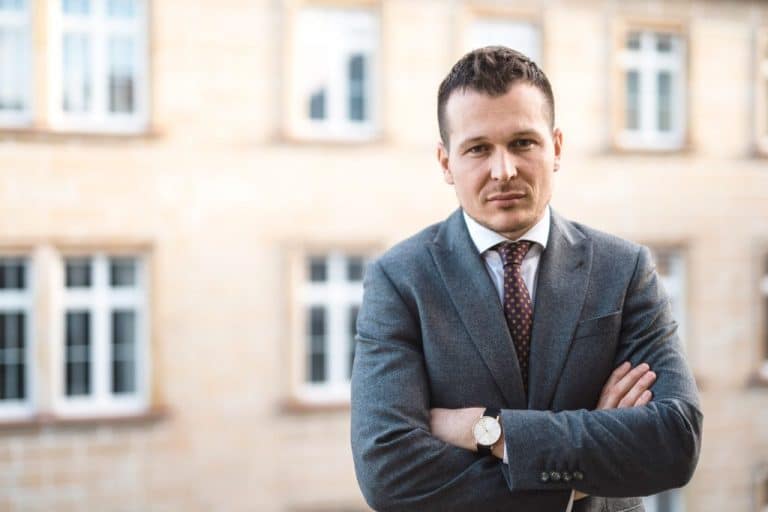
At the beginning of April 2020, the founders Peter Varga and Tomáš Demo gave an interview for the Slovak edition of the renowned global business magazine FORBES.
Peter Varga and Tomáš Demo have worked for the most important international law firms for years, where they provided legal and tax advice to the biggest players on the Slovak market.
For 2 years now, they have been successfully building the concept of “one stop shop” consultancy through Highgate Group.
As the economic crisis affects them not only as advisors but also as entrepreneurs, they have launched the project www.zachranfirmu.sk, which they want to help small and medium-sized companies to financially survive the impact of the coronacrisis.
What services do you provide?
Peter: We provide legal, tax and accounting advice for businesses under one roof.
The flagship of our consultancy has long been legal tax and levy optimisation, which is proving to be one of the key consultancy areas for straightforward and fast assistance to businesses right now.
It is important to remember that businesses at this time have to pay taxes for 2019, which has been a very successful and therefore profitable year for a large proportion of businesses.
These taxes are then used to calculate the advance income tax payments for 2020.
In both cases, however, the fall due to the coronary crisis is not taken into account.
We are therefore also trying now in 2020 to optimise companies’ tax liability for 2019 with defensible instruments and thus significantly improve their financial situation.
In addition, clients today naturally demand options to legitimately reduce their current levy burden, which includes not only monitoring and assistance using government solutions to help businesses, but also various other generally applicable tools for operational levy optimization.
Thomas: These solutions are not just purely tax and tax measures, as Peter describes, but companies also need practical legal advice.
Imagine a situation where a company has funds tied up in illiquid assets such as goods, has a bank loan with personal guarantees of the company’s directors or owners, and payments from customers are dramatically reduced or stopped altogether.
In such situations, the owner naturally needs to protect not only the company’s assets but also his personal assets.
For example, he may wish to legally cash out old dividends or excess liquidity from the company.
He may also wish to transfer a healthy part of his business, such as the e-commerce business, to a new company and continue in a limited business mode.
By doing so, he not only protects himself and his family to some extent, but he also helps to maintain employment by doing so.
However, even in the context of the legitimate interests of creditors, these and similar steps are always associated with certain legal and accounting constraints, which we can grasp and resolve for the entrepreneur in all their complexity.

In addition, a number of businesses will inevitably have to make staff reductions.
As the Labour Code does not provide for any relief in emergency situations such as a coronary crisis, laying off even part of the workforce with standard notice periods and severance pay can be devastating for the entrepreneur.
Here, we can also suggest alternative legal and practical solutions for entrepreneurs.
Peter: It’s in the complexity.
I’m an attorney who specializes in taxes.
In Slovakia, I have maybe up to ten advisers of this combination who are fully dedicated to the issue.
Several of them are very skilled and we often consult together on complex legal-tax constructions, we exchange experiences.
However, by default they work in multinational consultancies, which naturally have a different target group of clients.
Having also been an entrepreneur who has been through a lot in building companies with minuscule family capital, I know that our target group requires more practical and quickly applicable solutions.
Our client doesn’t want to hear legal platitudes and theoretical solutions for 150 euros an hour.
And since we also provide accounting and tax advisory services within the Highgate Group, I don’t know if there is any other such comprehensive advisory group for smaller and medium-sized companies in Slovakia.
Thomas: In practice, we have already confirmed several times that, especially in more complex cases, such as mergers, sales of companies, investor inputs or the use of the tax institute of the patent box or super deduction, it is necessary to combine legal, tax and accounting inputs.
Even in cases as simple as a cash contribution to a company by a shareholder, it is important to have the opinion of a tax adviser.
Otherwise, the client may subsequently be unpleasantly surprised by the tax consequences when withdrawing these funds from the company.
Although such an advisory package is offered by the larger international advisory firms, most client assignments go through two or three departments, which is not always time or cost effective for the client.
Peter: It’s good that they exist and naturally we help clients with the possibilities of using them.
It is important to remember that never in the history of Slovakia has it been necessary to take such comprehensive measures so quickly, so of course these measures cannot objectively be perfect.
Nor can it be ruled out that their current form will not create scope for unjustified abuse.
I firmly believe that the state will not rely on the honesty of entrepreneurs in this regard.
Thomas: As the state is unlikely to have sufficient capacity to monitor compliance with the conditions for receiving state benefits, it is very important that we advisers take strong exception to grossly abusive practices.
Peter: From small business owners, for whom we often propose a more tax-efficient model for their business, to complex tax analyses of cross-border transactions.
Right now, for example, I am commenting on the Slovak tax aspects in a 320-page loan agreement for a syndicate of UK and US banks financing a large acquisition in Central Europe.
However, our target group is mainly smaller and medium-sized companies.
It is in providing comprehensive advice to this segment that I see our greatest added value.
In addition to the above-mentioned services, we also provide these companies with standard accounting services and handle such details as the individual claims of owners and employees for maternity or nursing benefits.

Thomas: The composition of our clients is diverse in terms of size and segment in which they operate.
We manage accounting for startups with two founders, but also for companies with millions of turnovers.
We also account for such specialties as securities traders or investment funds with variable share capital.
Our tax and legal services are used by a number of angel investors, fast-growing Slovak companies, mainly from the IT and digital services sector.
Perhaps also thanks to our positive references, we are already being approached by large players such as O2, Bolt or TrustPay with requests for legal and tax advice.
Peter: The coronacrisis hit Slovak entrepreneurs very quickly and unexpectedly hard.
The most vulnerable companies are those that have no financial reserves or sufficient access to bank financing.
We started the project to help companies that are flexible enough to make major cost-saving decisions relatively quickly.
So today we have three webinars planned to discuss, among other things, the various options for rescuing companies in a practical way.
Thomas: It is now quite likely that the effects of the economic crisis in the coming weeks and months will be absolutely incompatible with our ideas from as recently as February 2020.
That is why the only solution for many entrepreneurs is to start crisis management and urgently reduce their operating costs as much as possible as well as protect their assets.
In addition to general advice in the form of webinars, we can also deal with entrepreneurs individually.
We can very quickly analyse the current situation in the company and accordingly propose a series of tailor-made measures to reduce costs, keep as many people as possible in the company or protect assets, including the rescue of healthy parts of the company.
Law & Tax
Tomas Demo
tomas.demo@highgate.sk
Accounting
Peter Šopinec
peter.sopinec@highgate.sk
Crypto
Peter Varga
peter.varga@highgate.sk